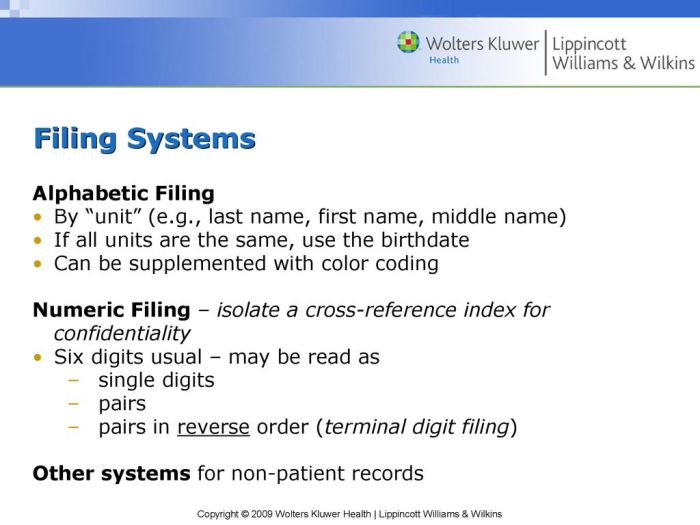Numeric filing provides extra confidentiality to medical records. – Numeric filing provides extra confidentiality to medical records, offering a significant advantage over traditional filing systems. This innovative approach enhances patient privacy and ensures the secure management of sensitive health information.
By assigning unique numeric identifiers to medical records, numeric filing eliminates the need for personally identifiable information, reducing the risk of unauthorized access and data breaches. This system promotes compliance with privacy regulations and safeguards patient trust.
Numeric Filing: Benefits and Implications

Numeric filing, an innovative approach to medical record management, assigns unique numerical identifiers to patient records instead of traditional identifiers like names or medical record numbers. This enhanced confidentiality measure offers numerous benefits and has significant legal and ethical implications.
Numeric filing significantly enhances confidentiality by eliminating the direct link between patient identities and their medical information. The numerical identifiers are not easily traceable to specific individuals, reducing the risk of unauthorized access and data breaches.
Moreover, numeric filing aligns with legal and ethical principles. It complies with data protection regulations that mandate the protection of patient privacy and confidentiality. By anonymizing patient data, numeric filing minimizes the potential for discrimination or bias based on sensitive information.
Comparison with Traditional Filing Systems: Numeric Filing Provides Extra Confidentiality To Medical Records.

| Feature | Numeric Filing | Traditional Paper-based Filing | Traditional Electronic Filing |
|---|---|---|---|
| Confidentiality | Enhanced confidentiality due to anonymization of patient identities | Low confidentiality, as records can be easily traced to individuals | Moderate confidentiality, but vulnerable to unauthorized access and breaches |
| Accessibility | Efficient access through numerical identifiers | Time-consuming and labor-intensive to retrieve records | Convenient access, but requires robust security measures |
| Cost-effectiveness | Cost-effective in the long run, as it reduces storage and retrieval costs | High storage and maintenance costs | Moderate costs, but ongoing maintenance and security expenses |
Implementation and Best Practices

Implementing a numeric filing system involves several key steps:
- Establish a unique numerical identifier system for patient records.
- Develop a robust encryption mechanism to protect the numerical identifiers.
- Implement access controls to restrict unauthorized access to medical records.
- Provide training to staff on the proper use and maintenance of the numeric filing system.
Best practices for maintaining confidentiality and compliance include:
- Use strong encryption algorithms to protect numerical identifiers.
- Restrict access to records only to authorized personnel.
- Regularly audit the system to identify and address any security vulnerabilities.
Technological Advancements

Technology plays a vital role in enhancing the confidentiality of numeric filing systems:
- Encryption algorithms, such as AES-256, provide robust protection for numerical identifiers.
- Blockchain technology offers a decentralized and tamper-proof ledger for storing and managing numeric identifiers.
- Artificial intelligence (AI) can be used to detect and prevent unauthorized access to medical records.
Future Trends and Considerations
Numeric filing is poised for further advancements:
- Increased adoption of blockchain technology for secure and transparent record management.
- Integration with artificial intelligence (AI) for enhanced security and data analytics.
- Development of new encryption algorithms to address emerging threats.
As numeric filing evolves, it will continue to shape the landscape of medical record confidentiality, ensuring the protection of patient privacy and compliance with regulatory requirements.
Expert Answers
What are the key benefits of numeric filing for medical records?
Numeric filing enhances confidentiality, improves accessibility, and reduces the risk of data breaches by eliminating personally identifiable information.
How does numeric filing compare to traditional paper-based filing systems?
Numeric filing offers superior confidentiality and accessibility compared to paper-based systems, as it eliminates the need for manual handling and reduces the risk of physical breaches.
What are the legal and ethical considerations surrounding numeric filing?
Numeric filing aligns with privacy regulations such as HIPAA, ensuring compliance and protecting patient rights. It also promotes ethical data management practices.